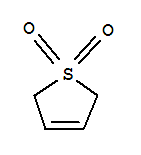| Identification |
| Name: | Thiophene,2,5-dihydro-, 1,1-dioxide |
| Synonyms: | 2,5-Dihydrothiophen-1,1-dioxide;2,5-Dihydrothiophene 1,1-dioxide; 2,5-Dihydrothiophene S,S-dioxide;2,5-Dihydrothiophene dioxide; 2,5-Dihydrothiophene sulfone; 3-Sulfolene;Butadiene sulfone; NSC 48532; NSC 56373; Sulfolene; Sulpholene; b-Sulfolene |
| CAS: | 77-79-2 |
| EINECS: | 201-059-7 |
| Molecular Formula: | C4H6 O2 S |
| Molecular Weight: | 118.15 |
| InChI: | InChI=1/C4H6O2S/c5-7(6)3-1-2-4-7/h1-2H,3-4H2 |
| Molecular Structure: |
 |
| Properties |
| Transport: | 25kgs |
| Melting Point: | 65 - 66 C
|
| Flash Point: | 112 C |
| Boiling Point: | Decomposes
|
| Density: | 1.3 |
| Stability: | Stable, but decomposes above the melting point. Combustible. Incompatible with strong oxidizing agents. |
| Water Solubility: | Soluble |
| Solubility: | Soluble |
| Appearance: | white crystals |
| Specification: |
2,5-Dihydrothiophene Dioxide (CAS NO.77-79-2) is a white crystalline solid.
First Aid Measures:
Eyes: Flush eyes with plenty of water for at least 15 minutes, occasionally lifting the upper and lower eyelids. Get medical aid.
Skin: Flush skin with plenty of water for at least 15 minutes while removing contaminated clothing and shoes.
Ingestion: Get medical aid. Wash mouth out with water.
Inhalation: Remove from exposure and move to fresh air immediately. If not breathing, give artificial respiration. If breathing is difficult, give oxygen.
Handling and Storage:
Handling: Wash thoroughly after handling. Remove contaminated clothing and wash before reuse. Avoid contact with eyes, skin, and clothing. Avoid ingestion and inhalation.
Storage: Store in a cool, dry place. Keep container closed when not in use.
|
| Report: |
NCI Carcinogenesis Bioassay (gavage); No Evidence: mouse, rat NCITR* National Cancer Institute Carcinogenesis Technical Report Series. (Bethesda, MD 20014) No. NCI-CG-TR-102 ,1978. . Reported in EPA TSCA Inventory.
|
| Flash Point: | 112 C |
| Color: | CRYSTALS |
| Safety Data |
| Hazard Symbols |
|
| |
 |